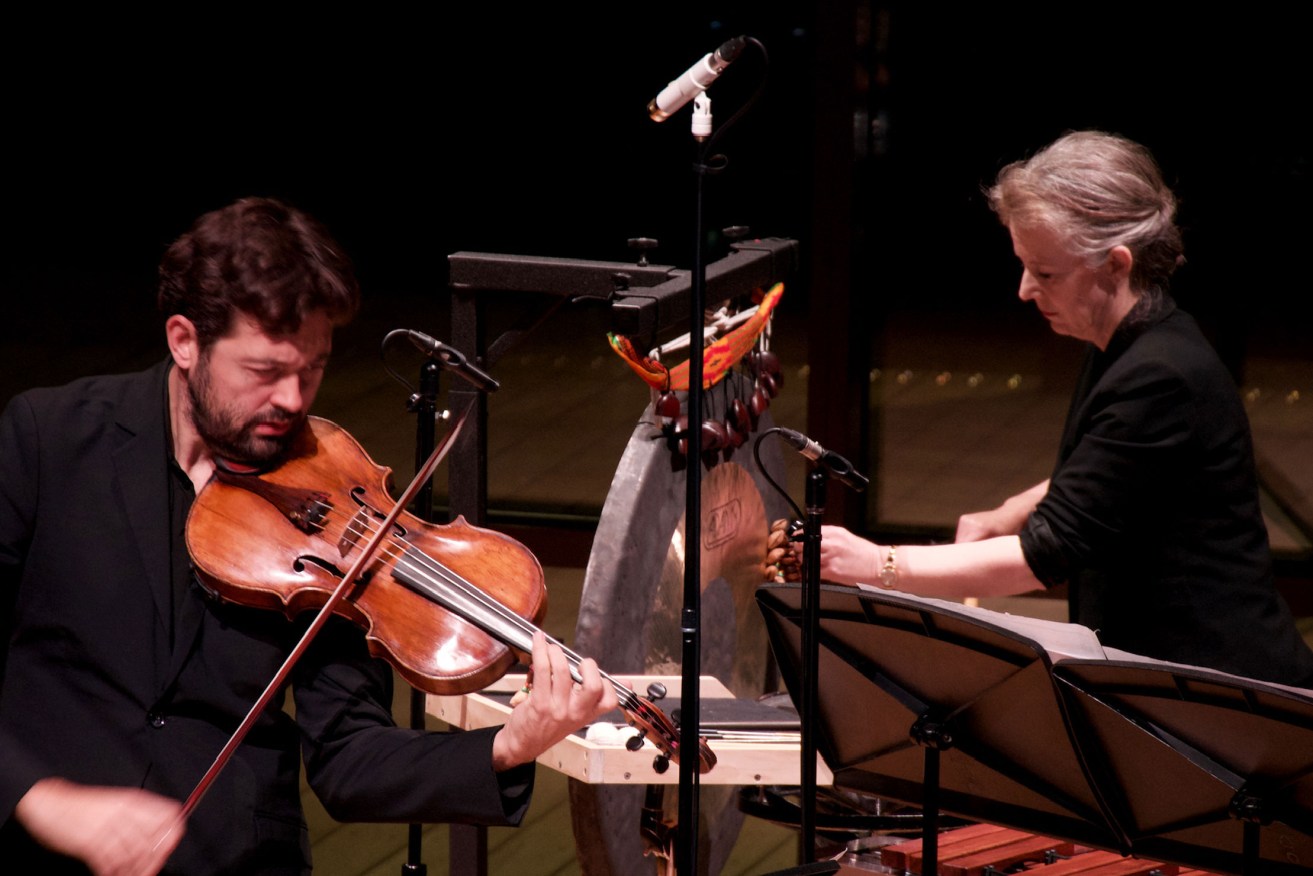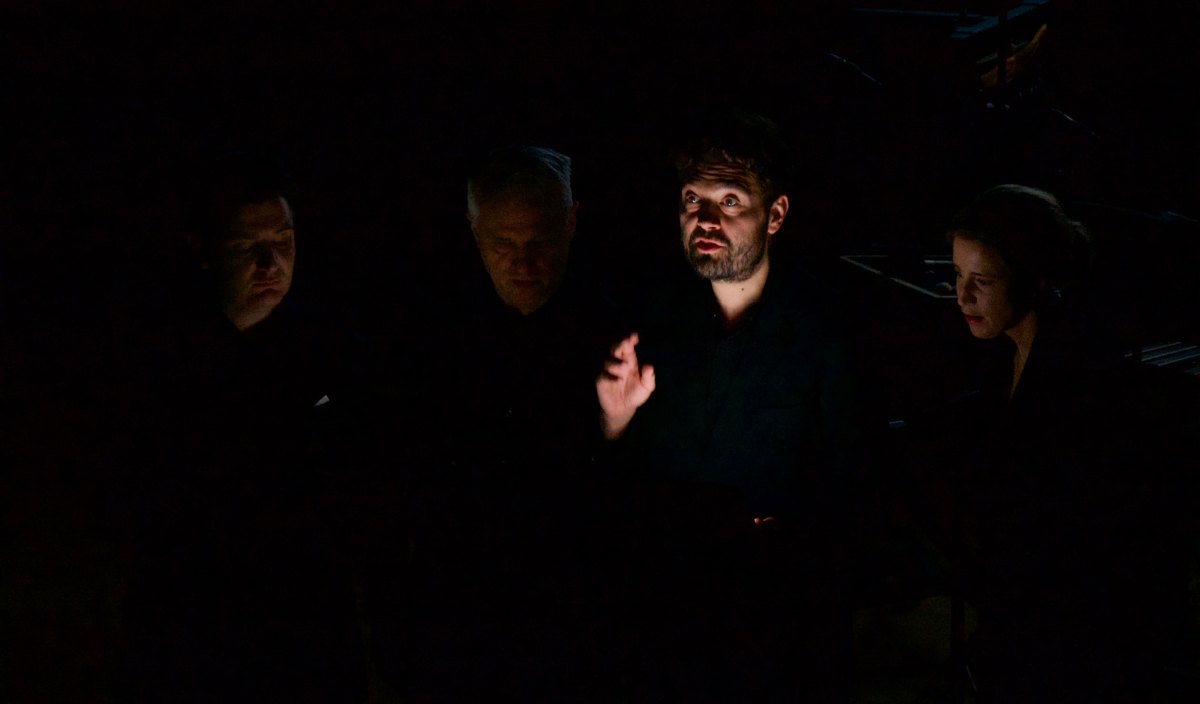Music review: Once Upon a Time at UKARIA
Invention ran free in Once Upon a Time, the first of five concerts in a three-day program at UKARIA showing different sides of a group of exceptional musicians.


Lawrence Power and Amanda Grigg perform 'Naturale' by Luciano Berio. Photo: Ben Nicholls
Looking at UKARIA’s website to see its year-long concert offerings is always an eye-opener, but it also brings a measure of regret: it’s simply not possible to get to all the top-shelf artists they manage to keep bringing out. This wonderful Adelaide Hills concert venue smothers anything else in terms of quality as far as local chamber music, and you’d really have to go to the Melbourne Recital Centre to find anything similar – which is no coincidence, because UKARIA and the MRC have built up close reciprocal ties.
UKARIA has something else up its sleeve that is truly special, and can only be compared with events in Europe such as Austria’s Lockenhaus Festival. This is its three-day cluster of exploratory concerts named UKARIA 24, in which musicians of international profile are invited in for a period residency to try out their most inventive ideas, unrestricted by the usual boundaries of concert design.
Some fantastic things have come of it. I remember cellist Nicolas Altstaedt playing the Bach cello suites while sitting barefoot against the large front picture windows with a pair of dancers from the Australian Dance Theatre gracefully swirling about in front of him. In the same event, an artist painted watercolours on a row of eight easels to the sound of Vilde Frang’s violin, with paint dripping everywhere. That was in 2018; other curators of UKARIA 24 over the years have included James Crabb, Diana Doherty and Umberto Clerici in 2021.
This year, its maître de l’invention was British violist Lawrence Power. A foremost and much-admired exponent of his instrument, he was here for that 2018 event, participating in a trio by Sándor Veress. Marvellous, he was, on the same super-league level as Altstaedt.
However, one senses even more itchy, impatiently inventive instincts in Power. In the first of his five UKARIA 24 concerts, entitled Once Upon a Time, invention ran so free that one literally felt in the dark at times as to what was happening. All culminated wondrously in the end, though, in an immensely powerful affirmation of the true values of chamber music.
Halfway through Taneyev’s mighty Piano Quintet in G minor, Op.30, a connection suddenly occurred (speaking for myself) that pulled the program together and fully revealed the thinking within. This was the link between this epic Russian chamber work – the musical equivalent of a Tolstoy novel – and the first composer on the program, Henry Purcell. Perhaps a few more words of elucidation were needed at the start.
Nevertheless, the concert began in an unusual and interesting way with the sounds of a jumpy bass line emanating from cellist Torleif Thedéen, who was stationed in one of the upper landings in the audience area. Quickly he was joined by strumming chords from Power’s viola as he wandered up from the stage – all this happening while the lights were out. The piece was Purcell’s “Curtain Tune on a Ground” from his masque Timon of Athens, all wonderfully spontaneous.

Alessio Bax, Torleif Thedéen, Lawrence Power and Vilde Frang perform ‘Story’ from Living Room Music, by John Cage. Photo: Ben Nicholls
Then the first of three filmed performances was projected on screen, speakers to either side. These were pieces from Thomas Adès’ 2016 opera The Exterminating Angel, for viola and piano. Power was himself present in these films, performing with the composer on piano in a private home in North London. Intriguingly, it thus allowed the composer to be virtually present at Mount Barker Summit; it was also appropriate, given that UKARIA had co-commissioned these works back in 2018 but was unable to present them until now.
A qualification, though: as creative as this idea of blending recorded and live performance was, a live performance of these three Berceuses for viola and piano would have been perfectly possible and actually more preferable acoustically, as UKARIA’s own Bösendorfer grand was sitting idly by and among this concert’s line-up was the very fine pianist Alessio Bax.
Either way, these Adès pieces were lovely and languid to hear – indeed, nothing like the violent horror of his opera from which they come – and when the curtains slowly drew apart to reveal UKARIA’s bushland setting at dusk, the effect was magical.
The assortment of pieces made this first half feel bit disconnected, but there was no doubting the sheer high calibre of Power and his musicians. Vilde Frang, returning to this UKARIA 24, played Tarréga’s Recuerdos de la Alhambra, originally a guitar piece, with the niftiest, neatest string crossings imaginable. Thedéen played Pablo Casals’ Song of the Birds, a simple but melodically evocative little piece, very nicely; and they all bunched together to great effect to narrate John Cage’s Living Room Music, a fun rhythmic piece based on Gertrude Stein’s whimsical poem The World Is Round.
Luciano Berio’s Naturale for viola, percussion and recorded voice was the main focus of interest. Here, Power produced the loveliest playing of the concert so far: pure of tone, thoughtful, and continually reaching into new expressive planes. Aided by Amanda Grigg’s sensitive additions of gong, marimba and other percussion instruments, it had the voice of a Sicilian folk singer, recorded by the composer in Palermo, playing over the speakers. This made it feel like a musical travelogue – a journey to some distant world.
Extremely animated treatment of another “curtain tune”, this time from Matthew Locke’s The Tempest, set the tone for the second half. Dynamic and full toned, the group – with Sophie Rowell joining on second violin – now turned to the mammoth-sized Piano Quintet in G minor, Op.30, of Sergei Taneyev. Best known as one of Tchaikovsky’s composition students, he produced music that is nothing like his teacher except for its generalised Russian flavour: tightly structured and geared around traditional values of form and counterpoint, it includes a constantly repeated descending bass line in its extraordinary Largo third movement.
This movement sounds deliberately borrowed from Purcell, in such works as “Rejoice in the Lord Always”, and it may well be. Whatever its provenance, the result is quite bizarre – centuries out of kilter – but artistically satisfying all the same.
And this performance was absolutely phenomenal. The five players, clearly fired up not only by the work itself but also this opportunity to play together, were razor-sharp in precision and eruptive in passion. It truly was like listening to a Deutsche Grammophon recording but live. One particularly admired Power’s ultra-quick reflexes to any changes of mood, and the way he fed his colleagues with energy. The power of Thedéen’s cello playing and the immaculate fiddling of Frang and Rowell were also a joy; and what a terrific pianist Bax is, too – so commanding.
The most rewarding thing about UKARIA 24 is how it gives the listener new and different insights into the concert experience. We saw here the different sides of an exceptional musician and his marvellous colleagues, perhaps as can never be achieved in a “straight” performance. The concept is enthralling.
Graham Strahle attended day one of the three-day UKARIA 24 program, curated by Lawrence Power, at UKARIA Cultural Centre at Mount Barker Summit.




